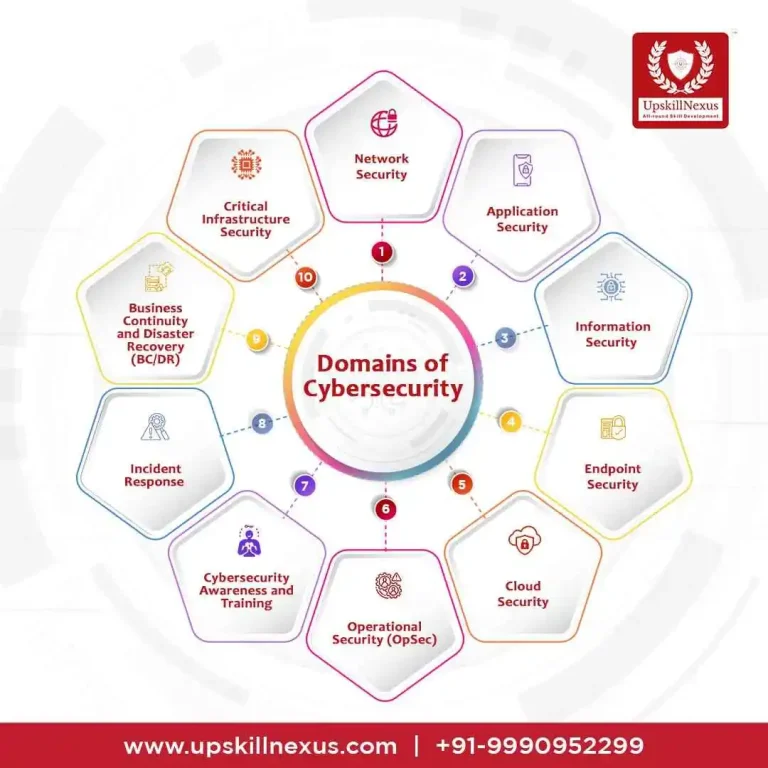Cybersecurity: Key Concept and Overview
In today’s connected world, the scope of cybersecurity is much more than the right tools; it involves smart choices to protect you against the dangers of the online world. Whether it is blocking data thieves, preventing hackers from doing something, or locking away personal information, strong cybersecurity relies on multiple layers of protection. The key is encryption, which helps keep your information not only safe but private as well. These plans are combined with powerful technology to safeguard individuals and business organisations from the constant online threats.
Main Cyber Threat Attacks
All of these cyber threats can be highly destructive depending upon what is being targeted and what kind of attack is involved.
1. Malware: Any malicious program intended to cause harm, disrupt, damage, or unwanted access to a computer system.
2. Phishing: Phishing refers to the act of trying to scam someone into disclosing something one wants to be secret, most probably his or her credit card number or passwords.
Usually, they make use of emails or some fake websites resembling some trustworthy organisations .
3. Ransomware: malicious software that locks or encrypts user data and demands a ransom, usually payable in cryptocurrencies, in exchange for its release.
4. Denial of Service (DoS) & Distributed Denial of Service (DDoS): This causes a network or website to become unavailable due to one or more attacks causing an overload of traffic.
5. Man-in-the-Middle (MitM) Attacks: This type of attack involves an attacker collecting and maybe changing communication between two parties without the parties’ permission.
Importance of Cyber Security

As our reliance on the internet increases, so does the existence of cybercrime, now one of the fastest-developing activities for criminals, which over time has led to the growth of cyber defence as protection against identity theft but also now, Data Protection across devices and networks.
This means that the tactics of cybercriminals are becoming more complex, and it is absolutely important to raise awareness about the evolving methods and targets of cybercriminals among individuals and organisations. The consequences of weak scope of cybersecurity measures can be drastic, including financial losses and reputational damage.
In this world, where anybody online is liable, the effective measures of cyber defence are very important because they protect sensitive information and create trust in digital activities. With evolving cyber threats every day, it is more crucial that cybersecurity should be the number one issue to not leave a virtual environment insecure for anyone.
Scope of Cybersecurity
The future of data security shall be defined by a few key factors that paint a picture of growing cybersecurity importance for our increasingly digital world. Let’s take a peek into some of these factors:
Cybersecurity Professional Shortage
The global market for cybersecurity professionals lags behind the demand; the World Economic Forum reports a shortfall of over 40,000 job vacancies for cybersecurity professionals in May 2023 were not filled due to talent shortages.
Professional skills gaps
These organisations are further experiencing severe challenges in recruiting good, highly qualified cybersecurity staff. Members often mention experience or less of the correct expertise needed to properly execute their role against the current cyber threats. Continuous education and certification need to be ongoing to maintain the knowledge base of these individuals and adapt them to handle security challenges well.
Rising global demand
More and more people are demanding operations and security management professionals worldwide. Estimates suggest that by 2030 there could be a global talent shortage of more than 85 million workers. In just six years, the Forum says this significant talent squeeze could lead to an estimated $8.5 trillion in unrealized annual revenue.
High-paying career opportunities
This is because a career in cybersecurity offers some of the best jobs in terms of pay available; hence, it is something to consider for career advancement. The field is competitive in terms of salary remunerations and ensures job security.
Unlimited Growth Potential
Today, cybersecurity roles are much more diversified than they were in the past; when they were mainly considered to be a support function, professionals would only have carried out crime scene investigations and incident responses and would have only secured applications. The continuous boom in the sector will provide abundant business as well as self-development opportunities.
Multiple career opportunities
As technology grows, cybersecurity professionals are going to be working across every industry whether it’s on robotics or the security of web sites and applications. This means they can work with a very wide client base, which generally makes network security a very promising field of career. Even with their diverse set of skills, these experts are going to remain high in demand as they work to solve emerging security challenges in scope of cybersecurity.
Primary Cyber Security Field

While every emerging cybersecurity professional has to scan through the very vast scope of cybersecurity carries, there are many specialised fields under the umbrella:
Network security
It covers how routers, switches, firewalls, and other network components are secured against intrusions, viruses, and data breaches. It also protects the network’s underlying infrastructure. Unauthorised access is detected by methods like IDS/IPS systems, firewalls, and VPNs. Data integrity and security are guaranteed during transmission thanks to encryption.
Information security
Sensitive data theft or compromise is prevented with information security. Information security is ensured by the CIA trinity of privacy, reliability, and availability; careful risk management; compliance with all data protection laws, including GDPR and HIPAA; and a strict security policy.
Application security:
The goal of application security is to protect software applications by finding, repairing, and preventing flaws in their code. In this area of application security, using safe coding best practices, testing programs manually and dynamically, and applying patches on a regular basis ensure that applications are protected from potential attacks.
Web applications are susceptible to attacks that include SQL Injection, Cross-Site Scripting (XSS), and Cross-Site Request Forgery (CSRF). Some of the protection measures with proper input validation, authentication, secure encryption, and WAFs can be used to protect a web application from common threats.
mobile applications cache sensitive data locally on a mobile device. Encrypted data at rest as well as storage methods to ensure that data in transit is protected (such as Keychain on iOS and Keystore on Android) should also guard against unauthorized access or theft of user information.
Cloud security
In simple terms, this is protecting cloud-based settings where data is processed and stored. The security of data, workloads, and apps spread over public, private, and hybrid cloud platforms has become increasingly important as more businesses go to the cloud. This covers access controls, encryption, and incident management for data breaches and illegal access to these kinds of cloud services.
Endpoint Security
The securing of the end is achieved by protecting certain devices, including laptops and desktops as well as cell phones, from cyber threats. Since entry points into the network are created by such devices, antivirus, EDR, and mobile device management solutions may mitigate risks associated with malware and phishing attacks and unauthorised access.
Identity and Access Management:
IAM stands for Identity and Access Management, representing the core aspect of governing who is able to access what resources within an organisation. IAM systems through MFA, SSO, and RBAC ensure access by legitimate personnel only to the most sensitive systems and data.
Governance, Risk, and Compliance
The Governance, Risk, and Compliance (GRC) ensures that the organisation’s cybersecurity policies align well with the standards of law, regulation, and industry. GRC develops security frameworks; it also audits the entity regularly to manage the risk associated with the threats to the organisation’s cybersecurity along the way to ensuring the meeting of compliance requirements.
Cryptography
Cryptography secures data by translating it into unintelligible codes that prevent unwanted access to sensitive information. Through key management and communication, cryptography secures data while it is in transit and at rest.
Infrastructural Security
Infrastructure security defends the company’s IT system against its physical and digital sections, including an organisation’s servers, networks, data centres, and hardware. It protects the business’ and business operations’ core nucleus and structures from cyber threats, physical damage, and internal vulnerabilities. Cybersecurity infrastructure prevents disruptions and unauthorised access to the core systems by protecting an organisation’s backbone technology securely.
Operations Security (OpSec)
Operations security, or OpSec, involves protecting sensitive information during business operations. It determines where the dangers are-actualized exposure and potential risks-whether via the employees’ actions or insecure communication channels-and measures these areas for leaks. OpSec will ensure that the businesses’ confidential processes and data stay safe from such unintended exposure or cyber threats.
Top Jobs for Cyber security Professionals
Applicants usually earn an IT degree or diploma and enroll themselves in various popular cyber security courses offered by many institutions as a starting point into a career in cybersecurity. Here are some entry-level to top-level cybersecurity jobs currently found in the market:

Chief Information Security Officer (CISO)
The appointment of a Chief Information Security Officer to the business has increasingly become the norm. Being a key person in aligning the data protection strategy with the organisational vision, technology, and business operation, where cyber threats are mounting with each passing day in this ever-changing global economy, the presence of CISO assumes correctness in the scope of cybersecurity.
The CISO identifies, develops, implements, and maintains the processes that could prevent security breaches. He drafts and reviews the company’s security policies and risk mitigation plans.
According to PayScale, the average salary of a CISO in India stands at about ₹2,240,648 annually and goes up to ₹40,000,000 based on experience. According to LinkedIn, there are over 223 CISO job postings available in India.
Cybersecurity Manager
Security managers are responsible for the security policies within an organisation and will plan ways to upgrade data and network security. They are a leader of dedicated IT professionals working towards the improvement of data management and security systems.
These managers carry out basic research on the latest cyber threat trends, which helps in drafting the security policies of the organisation. The average salary for a cybersecurity manager is about ₹2,195,801 per year after adjusting for better performance. In fact, over 170 cybersecurity Manager positions are available on LinkedIn in India shows the emerging scope of cybersecurity.
Security Architect
Security architects design the overall security architecture for networks and computer systems. They plan and design the different components of security and are very essential in recommending changes to security policies and protocols this role is highly demanding in future of cybersecurity.
Cybersecurity Analyst
Security measure planning, designing, and installation are duties of cybersecurity analysts. They also monitor the security access and perform internal and external audits that enable distinguishing possible risks for the safety of the network.
Other key duties of a cybersecurity analyst include:
Risk analysis
Vulnerability tests
Security assessment
Networking
Staff training
Awareness of best practices
Indeed reports that the average annual salary of a cybersecurity analyst in India is around ₹876,346, and can reach much more based on performance. The total number of active positions for data analysts in India listed on LinkedIn now is over 742.
Network Security Engineer
The Network Security Engineers play a vital role to ensure that a business runs effectively. Their primary tasks involve:
Vulnerability identification
Manage firewalls, network monitoring software, VPNs, routers, and switch management
System maintenance
Automation
According to Glassdoor, the average compensation per year in India for a Network Security Engineer is ₹400,000 with more than 392 job postings on LinkedIn.
Threat Analyst
What They Do: They monitor, analyse, and identify potential cyber threats. These people assess risks and provide insights into malware, phishing attacks, and vulnerabilities that can protect organisations.
Average Salary:
Entry-Level: ₹4–7 lakhs per annum
Mid-Level: ₹8–12 lakhs per annum
Senior-Level: ₹15 lakhs and above per annum
Penetration Tester
They simulate cyber attacks on networks, systems, and applications to discover any security weaknesses. They help the organisations resolve those vulnerabilities before malicious hackers could exploit the same.
Average Salary:
Entry-Level: ₹5-8 lakhs per annum
Mid-Level: ₹10-15 lakhs per annum
Senior-Level: ₹18 lakhs and above per annum
Digital Forensics Analyst
They recover and analyse all the digital evidence during such cybercrime investigations. They follow cyber-hunts after tracing hackers with the law enforcement or companies to preserve evidence for case files.
Average Salary:
Entry-Level: ₹4–6 lakhs per annum
Mid-Level: ₹7–10 lakhs per annum
Senior-Level: ₹12 lakhs and above per annum
Degrees and certifications for Becoming a Cyber security Professional:
It’s essential to recognize that there isn’t typically a specific degree created for the position of cybersecurity expert. On the other hand, a cybersecurity profession could benefit greatly from any kind of IT degree.
The majority of cybersecurity employment positions only ask for a bachelor’s degree in any field related to information technology. However, an IT diploma alone may be sufficient to open doors. There’s really no reason to worry too much about having the “perfect” degree for aspiring cybersecurity experts, as long as it’s relevant and an IT qualification. There is some certification also which can be beneficial for becoming a cyber security expert in the future of cybersecurity.
Certified Ethical Hacker (CEH),Certified OpSec Professional (COP),Offensive Security Certified Professional (OSCP),CompTIA Security+,EC-Council Certified Security Analyst (ECSA).
Skill required to become a cyber security professional
The requirements for cybersecurity in future each function in the cybersecurity profile vary. But in order to work in this field, you need to develop or have a few fundamental skills.
Networking and System Administration
Internet of Things (IoT)
Operating Systems (OS:
Cryptography
Endpoint Security:
Risk Management:
Operational Technology (OT)
Cloud Security
Programming & Scripting
Challenges Faced by Cybersecurity Professionals
Evolving Threat Landscape
The cyber threats continue to change in cybersecurity future. New vulnerabilities and attack vectors develop every day. Organisations must adapt to these trends, tactics, and technologies employed by their cybercriminals. This becomes a massive challenge.
Shortage of Qualified Professionals
A global shortage of qualified cybersecurity professionals makes the available staff feel overworked and overwhelmed. Organisations cannot easily replace them due to a lack of talent and cause security gaps.
Sophisticated Regulatory Environment
Cyberspace security experts need to be on an alert of a complex regime of regulations and compliance requirements. The same changes from industry to industry and region to region. A lot of time and energy is wasted keeping abreast with the same.
Insider Threats
Network Security risks from insiders may arise due to malicious intent or negligence. Insider threats are always on the cybersecurity teams’ minds, as constant training and vigilance are required.
Budget Constraints
Many organisations face budget constraints that become barriers to implementing necessary security measures, acquiring advanced tools, and investing in training and professional development.
Integration of New Technologies
When the organisations integrate such new technologies like cloud computing, IoT, and AI, integration of these new technologies into already existing systems must be done in a secure manner by cybersecurity professionals, who are considered one of the biggest
conclusion
The future of cybersecurity is bright with promise. It gets adequately bolstered by big players such as Cisco, Google, Facebook, Microsoft, IBM, and Fortinet, which are constantly looking out for cybersecurity experts to counter the ever-growing threats. Every day, the demand for learning opportunities from courses to certifications is opening up, and aspiring professionals are being prepared in that respect. Becoming a part of this industry at a time when India is increasingly focusing on digital transformation translates into stability and long-term growth in a cybersecurity career. The industry promises expansion and holds an important position in building the nation’s digital security landscape.
